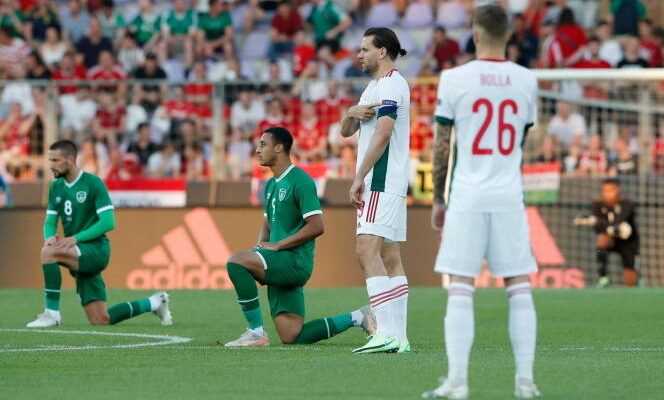The question of whether or not to perform this gesture has become common in the world of football. For a year, in the wake of the Black Lives Matter movement and the death of George Floyd, during a police arrest on May 25, 2020 in the United States, many players, especially in the Premier League (the English first division), kneel down before the start of the match in protest against racism. In the Champions League, the players of PSG and Istanbul Basaksehir had also respected it, in December 2020.
While the phenomenon had seemed to run out of steam in recent weeks, it has returned to sports and political news on the occasion of Euro 2021. Certain selections, such as England, Wales or Belgium have thus chooses to kneel before each game. This gesture provoked the whistles of part of the public, in Saint Petersburg and in London.
The players of the France team had announced, before their entry into the running, Tuesday, June 15, against Germany, their intention to follow suit. Cooled by the few nations ready to imitate them, and no doubt also by certain outraged political reactions which had followed this announcement – elected Republicans and the National Gathering had denounced it in advance – they finally gave up.
“We discussed it between us, and it is true that it is not the same symbol as at the beginning”, argued Raphäel Varane the day after the victory in Germany, regretting “The tension and the tension” around this topic.
“In the media, the goal has been achieved”
Since 2016 and the first knee posed by American football player Colin Kaepernick, the gesture has spread. He was picked up by basketball players in the NBA, the North American basketball league, and crossed the Atlantic, winning in football.
Above all, putting one knee on the ground is now allowed, even encouraged by institutions, such as the International Football Federation (FIFA) or UEFA, the body that manages football in Europe, while Colin Kaepernick has never could find the grounds because of the hostile reaction of the NFL, the American football league, and the franchises which compose it.
“Due to its global scope, it is an unprecedented phenomenon in sport”, believes Claude Boli, sports historian. But, from the generalization of the act to what some see today as a trivialization, there is only one step. With, as a corollary, a question: does putting a knee on the ground have a political significance? “The risk is to distort the gesture, agrees Claude Boli. Some may have seen it as a reflex, a fad, in which case it is useless. “
The Euro has shown that the initiative was not unanimous. On the eve of the competition, the Hungarian Prime Minister, Viktor Orban, had denounced a “Kneeling business” and an ” provocation “. “In view of the disputes that this gives rise to, we cannot say that it has become automatic”, notes Carole Gomez, research director at IRIS specializing in sport. “The question is also that of the aim pursued: is it a question of raising public awareness of racist discrimination? Is it effective? In any case, in the media, the objective is achieved. “
More and more politicized athletes
Seeing the players kneeling on the ground feeds the debates all the more as many sportsmen from the Old Continent are less used to this kind of political position than their Anglo-Saxon counterparts. For Claude Boli, “It has something to do with Protestant ethics. In England, where support for Black Lives Matter has been much stronger, it is more a matter of individuals than in France. Athletes, successful people, have a social responsibility. There is a real philanthropic culture ”.
However, in football, and in sport in general, institutions and clubs most often aspire to the neutrality of athletes on political and societal issues – all the more in selection, where they are expected to be ‘they unite the nation.
Social networks have changed the situation somewhat in recent years. They offered players a new space for expression, including on these political and societal issues. “This allowed the development of their critical thinking, which was hindered for a very long time, Carole Gomez details. But, even today, if an athlete takes sides, he is referred to his dirty work, telling him that it is not his job. “
Putting the knee on the ground against racist discrimination is part of this assertion of athletes in their role as citizens. More than a year after the death of George Floyd, is this gesture likely to continue? For the researcher, “It will be interesting to observe the behavior of the players between now and the end of this Euro, to see how this political message will evolve”.
Our selection of articles on Euro 2021
